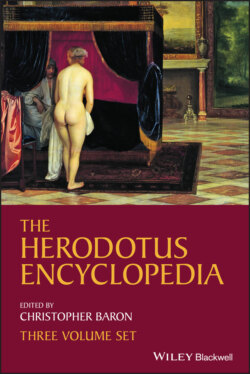Читать книгу The Herodotus Encyclopedia - Группа авторов - Страница 575
ARETĒ (ἀρετή, ἡ)
ОглавлениеJESSICA M. ROMNEY
MacEwan University
Aretē (ἀρετή) is a competitive value often translated as “excellence” or “virtue.” For HOMER and HESIOD there are many different types of aretē (cf. Tyrtaeus F12 West, IEG 2), and Herodotus similarly uses aretē to cover a range of “excellence,” though he focuses on martial excellence. Plato and ARISTOTLE use aretē to denote virtue more broadly (for a discussion of how aretē evolves from Homer onwards, see Adkins 1960, esp. 70–85).
In Herodotus’ narrative, there are three categories of aretē. The first is aretē as general excellence (1.134; 3.88, 106; 4.198; 7.5, 237; 8.144). The inscription on DARIUS I’s statue, for example, states that he gained the crown “through the prowess (ἀρετή) of his horse” (3.88). Likewise, the quality of a region’s soil is indicated by its aretē; LIBYA’s is “too poor” (οὐδ’ ἀρετήν (4.198)), while MARDONIUS comments on the fertility of EUROPE’s soil (7.5.3).
The second type of aretē is that won or recognized through COMPETITION (3.82, 120; 8.26). In this regard, Herodotus’ use of aretē is similar to that of Homeric EPIC, where HEROES compete to win aretē on and off the battlefield. Negative competition over aretē includes the example of oligarchic strife given by Darius in the CONSTITUTIONAL DEBATE (3.82) and MITROBATES’ and OROETES’ comparison of their achievements (κρινομένων περὶ ἀρετῆς) which becomes the catalyst for the fall of POLYCRATES. A potential positive example appears when the Persians deride the Greek practice of competing for aretē in the Olympic Games instead of for MONEY (8.26; on athletic aretē, see Golden 2004, 15).
The final type of aretē is that displayed during combat (1.52, 176; 5.49; 7.102, 154, 181, 225; 8.1, 92; 9.21, 28, 40, 70, 71). This form is defined by DEMARATUS as he asserts that the Greeks have an aretē learned from wisdom and strong LAWS to keep poverty and absolute rule at bay (7.102). Most displays of martial aretē are by Greek individuals or forces; the Xanthians against HARPAGUS (1.176) and the Persians in the skirmishes leading up to PLATAEA (9.40) are the two exceptions. PYTHEAS SON OF ISCHENOUS is twice singled out for his aretē (7.181; 8.92); he and GELON (7.154) are the only historical individuals whose aretē is remarked upon. The majority of instances of martial aretē occur in Books 7–9, primarily in connection with the major battles of THERMOPYLAE, SALAMIS, and Plataea. Martial aretē can also take the form of a prize; in 9.71 Herodotus ranks the two sides and their contingents, awarding the “prize of valor” (ἀρετή) to the Lacedaemonians.
SEE ALSO: Athletes and Athletic Games; Courage; Honor; Warfare; Xanthus
